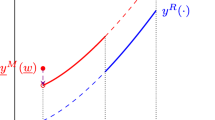Abstract
We argue that formal theories of justice cannot neglect the moral intuitions existing in society and illustrate this claim with empirical results. We analyse the perception of justice in a production context by starting from the surplus sharing model. Our questionnaire method is closely related to the work of Yaari and Bar-Hillel [14]. Our results suggest that differences in effort are considered to be the main justification for income differences. Our respondents strongly disagree about the remuneration of innate capabilities. It is further suggested that surplus sharing and cost sharing models cannot be treated symmetrically, because people react differently towards gains and losses.
Similar content being viewed by others
References
Aumann RJ, Maschler M (1985) Game theoric analysis of a bankruptcy problem from the Talmud. J Econ Theory 36:195–213
Deutsch M (1975) Equity, equality and need: what determines which value will be used as the basis of distributive justice? J Soc Iss 31:137–149
Deutsch M (1983) Current social psychological perspectives on justice. E J Soc Psychol 13:305–319
Kahneman D, Knetsch J, Thaler R (1986) Fairness as a constraint on profit seeking: entitlements in the market. Am Econ Rev 76:728–741
Lerner MJ (1975) The justice motive in social behavior: introduction. J Soc Iss 31:1–19
Leventhal GS (1976) The distribution of rewards and resources in groups and organizations. Berkowitz L, Walster E (eds) Advances in experimental social psychology. Academic Press, New York, pp. 91–131
Lewis A (1982) The psychology of taxation. Martin Robertson, Oxford
Moulin H (1987) Equal or proportional division of a surplus, and other methods. Int J Game Theory 16:161–186
Nozick R (1974) Anarchy, state and utopia. Basil Blackwell, Oxford
Roemer J (1986) The mismarriage of bargaining theory and distributive justice. Ethics 73:88–110
Schokkaert E, Lagrou L (1983) An empirical approach to distributive justice. J Publ Econ 21:33–52
Sen A (1985), Well-being, agency and freedom. J Philos 82:169–221
Varian H (1974) Equity, envy and efficiency. J Econ Theory 9:63–91
Yaari ME, Bar-Hillel M (1984) On dividing justly. Soc Choice Welfare 1:1–24
Young HP (1984) Taxation and bankruptcy, Discussion Paper, School of Public Affairs, University of Maryland
Author information
Authors and Affiliations
Additional information
Centre for Economic Studies, K.U. Leuven and Department of Psychology, K.U. Leuven respectively. Previous versions of this paper have been presented at the “International Conference on Social Justice in Human Relations” (Leiden, 1986) and at a conference on “Economic Models and Distributive Justice” (Brussels/Namur, 1987). Comments by participants at these conferences are gratefully acknowledged.
Rights and permissions
About this article
Cite this article
Schokkaert, E., Overlaet, B. Moral intuitions and economic models of distributive justice. Soc Choice Welfare 6, 19–31 (1989). https://doi.org/10.1007/BF00433360
Received:
Accepted:
Issue Date:
DOI: https://doi.org/10.1007/BF00433360




